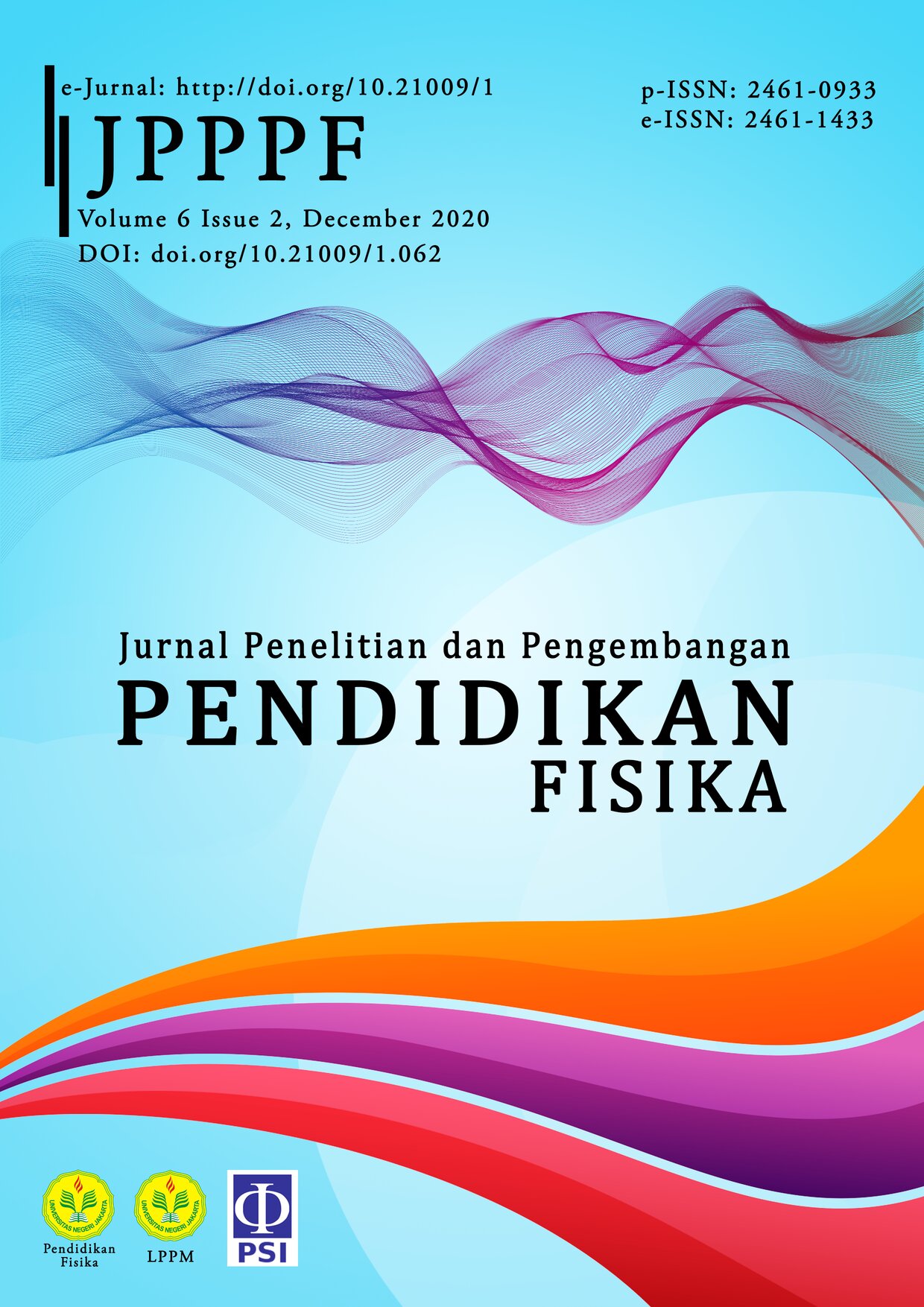Levels of Inquiry-Interactive Demonstration: Its Effect on Students' Critical Thinking Ability in Online Learning with the Topic of Waves and Sounds
DOI:
https://doi.org/10.21009/1.06212Keywords:
levels of inquiry model, interactive demonstration, critical thinking ability, online learningAbstract
This study aims to determine the effect of Levels of Inquiry-Interactive Demonstration on students' critical thinking ability at UIN Sunan Kalijaga Yogyakarta. This research is a quasi-experimental type with a pretest-posttest control group design. The research sample was taken using a cluster sampling technique. The sample consisted of the experimental class (PGMI A) composed of 41 students using the Inquiry-Interactive Demonstration model. The control class (PGMI B) was composed of 41 students using conventional learning models lecture and assignment methods. The data collection technique used was a test through quizizz, google form, observation, and documentation. The data analysis technique used descriptive statistics which were, preceded by a normality test. Hypothesis testing using the T-test. The results showed that the pretest-posttest mean score increased, namely the pre-test 68.49 and the post-test 85.27 with Tcount 11.95 > Ttable 2.023. Then the results of the sig value. 0.000 < 0.05 means that using the Inquiry-Interactive Demonstration model has a significant effect on students' critical thinking abilities on the topic of waves and sound.
References
Bao, W 2020, ‘COVID ‐19 and online teaching in higher education: A case study of Peking University’, Human Behavior and Emerging Technologies, vol. 2, no. 2, pp. 113-15.
Costa, AL & Presseisen, BZ 1985, ‘Glossary of Thinking Skill, in A.L. Costa (ed)’, Developing Minds: A Resource Book for Teaching Thinking, ASCD, Alexandria.
Deepika, N 2020, ‘The impact of online learning during COVID-19: students’ and teachers’ perspective’, The International Journal of Indian Psychology, vol. 8, no. 2, pp. 784-93.
Dewey, J 1938, ‘Logic: The Theory of Inquiry’, in Henry Holt and Company, New York.
Dholo, TF, Firman, H, Kaniawati, I & Rusdiana, D 2019, ‘Profile of critical thinking skills of pre-service physics teachers: A preliminary study’, Journal of Physics: Conference Series, vol. 1157, no. 3, pp. 1-6.
Duran, M & Dökme, I 2016, ‘The effect of the inquiry-based learning approach on student’s critical-thinking skills’, Eurasia Journal of Mathematics, Science and Technology Education, vol. 12, no. 12, pp. 2887-908.
Ennis, RH 1993, ‘Critical thinking assessment’, Theory Into Practice, vol. 32, no. 3, pp. 179-186.
Gunawan, YY, Sarwanto & Nurosyid, F 2019, ‘The analysis of students’ critical thinking skill through ethnoscience instruction integrated on the topic of magnetic field’, AIP Conference Proceedings, vol. 2194, December.
Harizah, Z, Kusairi, S & Latifah, E 2020, ‘Student’s critical thinking skills in interactive demonstration learning with web based formative assessment’, Journal of Physics: Conference Series, vol. 1567, no. 4.
Hu, W, Jia, X, Plucker, JA & Shan, X 2016, ‘Effects of a Critical Thinking Skills Program on the Learning Motivation of Primary School Students’, Roeper Review, vol. 38, no. 2, pp. 70-83.
Jaber, LZ, Hufnagel, E & Radoff, J 2019, ‘This is Really Frying My Brain!: How Affect Supports Inquiry in an Online Learning Environment’, Research in Science Education.
Kirana, IE & Kusairi, S 2019, ‘Profil Kemampuan Berpikir Kritis Mahasiswa Program Studi Pendidikan IPA dalam Kasus Grafik Kinematika Satu Dimensi’, Jurnal Pendidikan: Teori, Penelitian, dan Pengembangan, vol. 4, no. 3, pp. 363-68.
Lau, JYF 2011, ‘An Introduction to Critical Thinking and Creativity: think More, Think Better’, John Wiley And Sons Inc, New Jersey.
Lismaya, L 2019, ‘Berpikir Kritis & PBL (Problem Based Learning)’, Media Sahabat Cendekia, Surabaya.
Lukitasari, M, Hasan, R & Murtafiah, W 2019, ‘Using critical analysis to develop metacognitive ability and critical thinking skills in biology’, Jurnal Pendidikan Biologi Indonesia, vol. 5, no. 1, pp. 151-158.
Maulana 2018, ‘Dasar-dasar Konsep Peluang: Sebuah Gagasan Pembelajaran dengan Pendekatan Metakognitif’, UPI Press, Bandung.
Mustikasari, VR, Suwono, H & Farhania, K 2020, ‘Improving students’ science learning outcomes through joyful-inquiry interactive demonstration assisted by game android’, AIP Conference Proceedings, vol. 2215, April.
Rosyidah, ND, Kusairi, S, Taufiq, A & Affriyenni, Y 2020, ‘Profile of students’ critical thinking processes on the topics of Hydrostatic Pressure and Archimedes’ principle’, Journal of Physics: Conference Series, vol. 1511, no. 1.
Siburian, J, Corebima, AD, Ibrohim & Saptasari, M 2019, ‘The correlation between critical and creative thinking skills on cognitive learning results’, Eurasian Journal of Educational Research, vol. 2019, no. 81, pp. 99-114.
Sudigdo, A & Setiawan, B 2020, ‘Level of Inquiry in Senior High School Central Java, Indonesia’, Journal of Xi’an University of Architecture & Technology, vol. XII, no. V, pp. 2838-845.
Sugiyono 2011, ‘Metode Penelitian Kualitatif, Kuantitatif dan R&D’, Alfabeta, Bandung.
Sulistiawan, F, Sumardi, K & Berman, ET 2017, ‘Penerapan Model Pembelajaran Levels of Inquiry untuk Meningkatkan Hasil Belajar Siswa SMK’, Journal of Mechanical Engineering Education, vol. 4, no. 1, p. 41.
Trianto 2010, ‘Mengembangkan Model Pembelajaran Tematik’, PT Prestasi Pustaka, Jakarta.
Wenning, CJ 2005, ‘Levels of inquiry: Hierarchies of pedagogical practices and inquiry processes’, Journal of Physics Teacher Education Online, vol. 2, no. 3, pp. 3-11.
Wenning, CJ 2011, ‘The Levels of Inquiry Model of Science Teaching’, J. Phys. Tchr. Educ. Online, vol. 6, no. 2, pp. 9-16.











